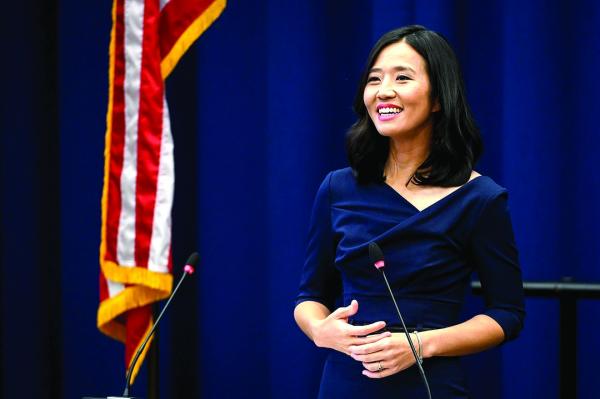November 17, 2021

Mayor Michelle Wu was sworn in as the Mayor of Boston during a ceremony in the City Council Chambers at Boston City Hall on Tuesday, Nov. 16. Mayor’s Office Photo by Jeremiah Robinson
Following are the remarks Mayor Michelle Wu prepared for delivery after her swearing-in on Tuesday at Boston City Hall.
Good afternoon Wu Train family, we’re back together so soon! I’ve missed you over the last two weeks. Thank you Mayor Janey for your beautiful remarks and your trailblazing leadership, and thank you Senator Warren, Senator Markey, Congresswoman Pressley, Governor Baker, and all our colleagues in state, county, and local government for sharing this moment.
Thank you especially to the Boston City Council for hosting us here. President Pro Temp O’Malley, sitting members, and incoming new Councilors-elect: Ruthzee Louijeune, Erin Murphy, Brian Worrell, Kendra Hicks, and Tania Fernandes Anderson — Congratulations, and I can’t wait to celebrate your Inauguration in January!
Thank you, Boston. I am honored to stand here, in this chamber that has meant so much to me, as your next Mayor.
The first time I set foot in Boston City Hall, I felt invisible— swallowed up by the maze of echoing concrete hallways, intimidated by the checkpoints and looming counters, reminded that my immigrant family tried to stay away from spaces like these.
But our family’s struggles brought me to an internship with Mayor Menino and his chief of staff, Mitch Weiss, and an unexpected full-circle journey over the last decade.
Today, I know City Hall’s passageways and stairwells like my own home. And this space is most special. I learned the ropes of city government and politics on this floor, held the gavel on this floor, nursed babies on this floor, delivered paid parental leave on this floor, language access, food justice, housing protections, climate progress, and I have reveled in the growing representation and power of our communities that our Boston City Council continues to embody.
But since we’re here today, I must share that the Council floor wasn’t always this way. When I joined the Council, this space wasn’t fully accessible to everyone. The floor that some are sitting on right now was much lower, designed as a pit three steps down — a striking feature part of what many or I would call the beautiful architecture of City Hall.
Three steps prevented Bostonians in wheelchairs and with mobility challenges from coming down directly to testify on this floor and advocate for change. Those three steps were a barrier between our government and the people we are here to serve.
So we changed what this space could be, reshaped it to be accessible for everyone, and brought the floor level up three steps. When we make City Hall more accessible, we are all raised up. When we communicate in many languages, we all understand more.
Most of all, when we connect the power of city government to the force of our neighborhoods and communities, we see how much is possible for our city.
City government is special. We are the level closest to the people, so we must do the big and the small. Every streetlight, every pothole, every park and classroom, lays the foundation for greater change. Not only is it possible for Boston to deliver basic city services and generational change — it is absolutely necessary in this moment.
We’ll tackle our biggest challenges by getting the small things right, and by getting City Hall out of City Hall and into our neighborhoods, block by block, street by street.
After all, Boston was founded on a revolutionary promise: that things don’t have to be as they always have been. That we can chart a new path for families now, and for generations to come, grounded in justice and opportunity.
And we can take steps to raise us all up to that promise, together.
Several weeks ago, at Roxbury Community College, I met a young leader and student in our community. Brandon lives in Mattapan and takes the 28 Bus to class. He found out one day from a local business on Blue Hill Ave that the mayor of Boston had worked to make the 28 Bus free, and it changed his life. What used to be a frequent headache of asking mom for $2 to get to class, opened up into justice and opportunity.
For Brandon and for our communities:
Our charge is to see every person and listen. To meet people where they are. To give hope. And to deliver on it. To find joy, in the words of the amazing Kim Janey, and spread it. Let history note not just who she was in this office, but all she got done, and all she will continue to do for our city.
Our charge is to fight urgently for our future, for the young people at the Burke High School who are here with us today, for Blaise, Cass, Ellie, and Addie, for all our kids, and their kids to come.
The first time I set foot in Boston City Hall, I felt invisible. Today I see what’s possible in this building, and I see all the public servants raising us up — frontline workers, first responders, teachers and bus drivers, building inspectors, city workers. I am deeply honored to work alongside you and I ask everyone to join me in expressing our gratitude for your service. And I ask everyone to join us in service of our communities.
Boston, our charge is clear. We need everyone to join us in the work of doing the big and the small, getting City Hall out of City Hall, and embracing the possibility of our city.
The reason to make a Boston for everyone is because we need everyone for Boston, right now. We have so much work to do, and it will take all of us to get it done. So let’s get to work.




